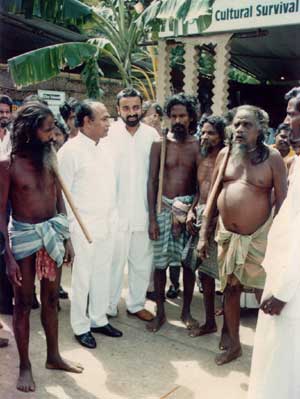
|
|
Cultural Survival of Sri Lanka has spearheaded efforts to facilitate dialogue between the Government of Sri Lanka and its indigenous citizens. Above: Senior parliamentarians including Deputy Speaker Hon. Gamini Fonseka meet Wanniyalaeto elders under Cultural Survival auspices in December 1992.
|
What is Cultural Survival?
For over two decades prior to its incorporation, Cultural Survival was an organic community of concerned individuals drawn from Sri Lanka and other countries, who were independently engaged in studies of oral traditions, and man-nature relationships among surviving traditional communities. Over this long period, this circle of individuals undertook numerous worthwhile studies exploring and substantiating indigenous wisdom traditions. This field research and related activities had no formal organization or administration.
In May 1988, they came together as a body for the first time and created the Kataragama Devotees Trust. As the scope of activities grew, in 1989 the Cultural Survival Trust was created by a deed of trust. On the 5th of May 1991, Cultural Survival was incorporated under the Companies Act No.17 (1982), with the work 'limited' deleted from the name. On 28th February 1992, Prime Minister D.B. Wijetunge, in his capacity as the Minister of Finance, gave gazette notice that Cultural Survival had been granted approved charity status under the Inland Revenue Act No.28 of 1979, Section 31 (9) (a).

